Key takeaways:
- Trainee evaluations are essential for personal growth, providing feedback that reflects strengths and areas for improvement.
- Effective evaluations include clarity, specificity, self-reflection, and ongoing dialogue to foster development.
- Challenges in evaluations include time constraints, emotional responses, and varying evaluator expectations, necessitating a balanced approach.
- Creating a supportive environment and personalizing feedback enhances the evaluation experience, leading to more honest discussions and motivation for growth.
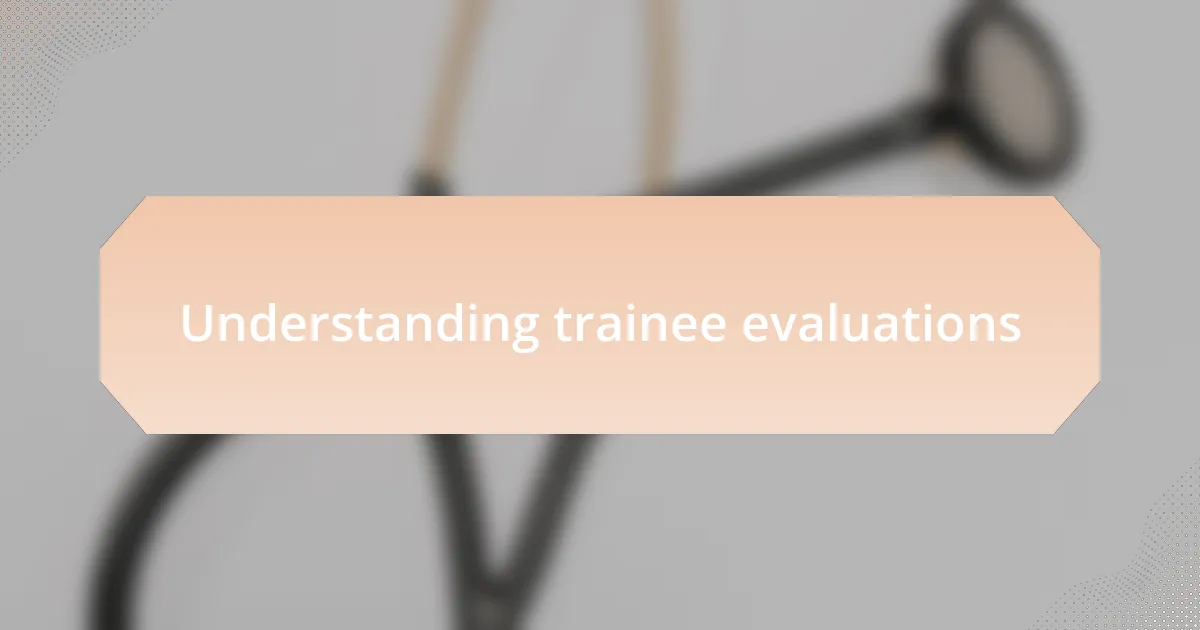
Understanding trainee evaluations
Trainee evaluations serve as a vital tool for growth and reflection, not just for the trainees, but for the entire ministry. I remember my first evaluation vividly; the anticipation mixed with anxiety was overwhelming. Was I truly making an impact, or was I just going through the motions? Those feelings weren’t just about passing a test; they were about discovering my strengths and areas for improvement.
As I navigated through evaluations, I began to understand their true purpose. They are not just a checklist of competencies; they’re a mirror reflecting our experiences, interactions, and personal growth within the hospital setting. When I received feedback that highlighted my compassionate approach to patient care, it filled me with a sense of validation that encouraged me to delve deeper into my role. Have you ever experienced that pivotal moment when feedback altered your perspective?
It’s also important to recognize that evaluations can stir a mix of emotions. One evaluation left me feeling disheartened, as I hadn’t met certain expectations. However, that experience ultimately prompted me to seek guidance and take actionable steps towards improvement. In reflecting on my journey, I realized these evaluations aren’t merely assessments; they’re opportunities to forge a deeper connection with our calling in hospital ministry.
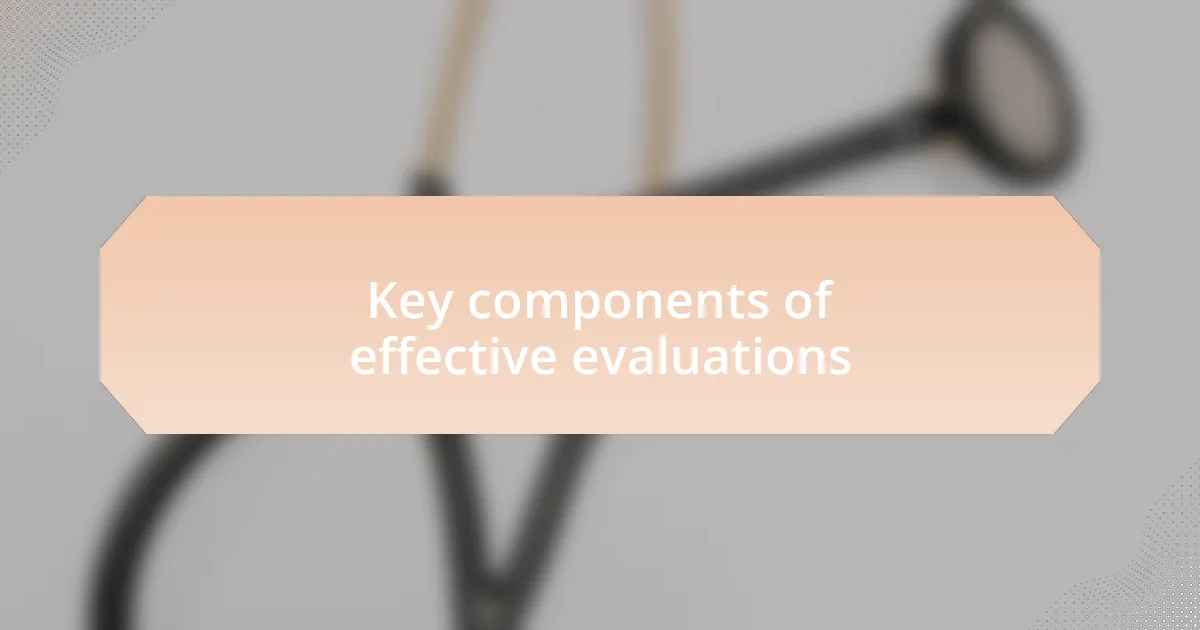
Key components of effective evaluations
Effective evaluations hinge on clarity and specificity. For instance, when I was evaluated on my communication skills, the feedback I received was detailed and actionable. Instead of a general comment like “good job,” my evaluator highlighted moments where I excelled and where I could improve, such as providing clearer explanations to patients. This level of detail made it easier for me to focus my efforts on tangible changes.
Another essential component is the inclusion of self-reflection. During one evaluation, I was encouraged to share my own observations about my performance. I realized that my perspective didn’t always align with how others saw my actions. This self-reflection not only deepened my understanding of my growth areas but also instilled a sense of accountability. Have you ever gained new insights by simply thinking about your own experiences?
Lastly, the role of ongoing dialogue cannot be overstated. After a particularly challenging evaluation, I sought follow-up conversations with my mentor. Those discussions provided a safe space to express my concerns and clarify expectations. This back-and-forth created a supportive environment that fostered my development. Reflecting on this, I often wonder—how many times do we miss out on valuable growth opportunities by not engaging in conversations about our evaluations?
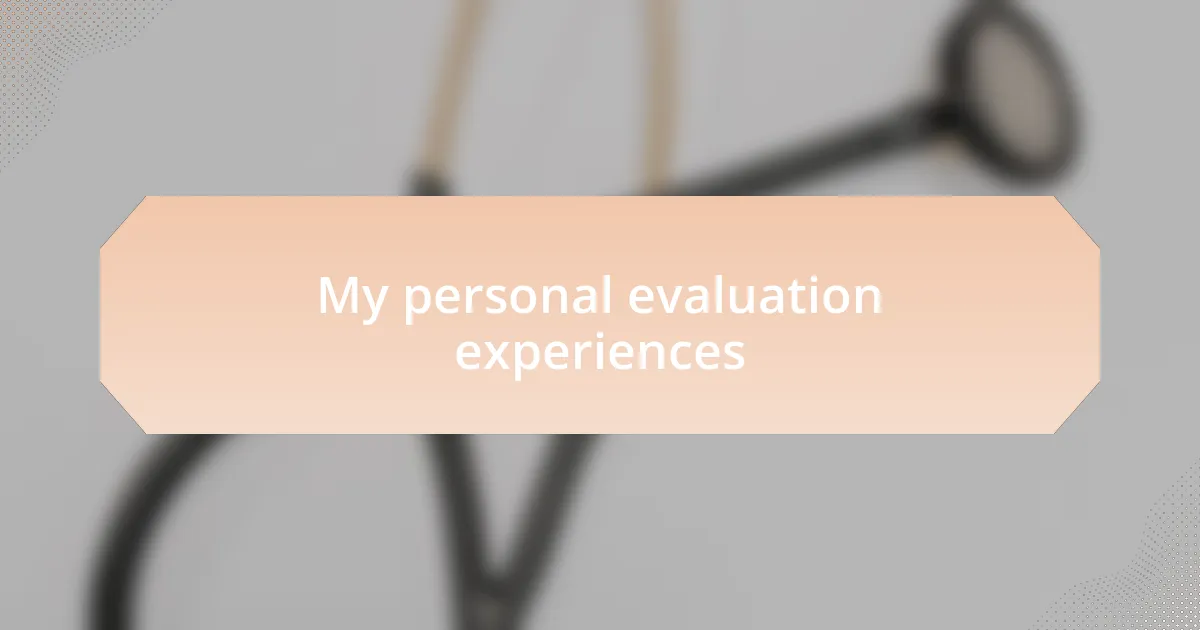
My personal evaluation experiences
My evaluation experiences have always been a mix of anxiety and excitement. I remember during one evaluation, my heart raced as I prepared to discuss my patient interactions. When my evaluator pointed out specific instances where I truly connected with a patient, I felt a wave of pride wash over me. It was in those moments I realized how much my efforts mattered.
One particular evaluation stands out to me. I received feedback about my approach towards handling difficult conversations. Initially, I felt defensive, but then I took a step back and asked myself why my evaluator felt that way. That reflection led me to acknowledge my hesitance in being fully transparent at times. It was eye-opening; have you ever been struck by how swiftly self-awareness can enhance our skills?
Lastly, there was an evaluation that felt almost like a personal awakening. My evaluator encouraged me to embrace vulnerability—something I had shied away from. The realization that admitting my weaknesses could actually be a strength left me both humbled and motivated. I began to wonder: what if embracing our flaws could unlock our highest potential? This thought transformed how I viewed evaluations, making them a source of growth rather than dread.
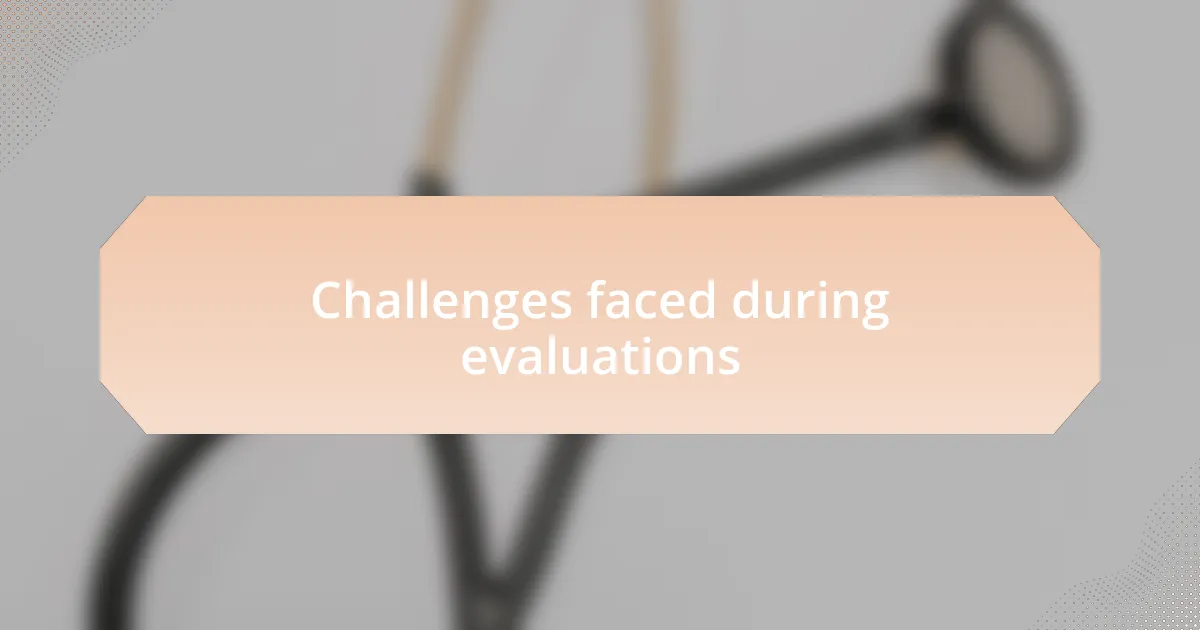
Challenges faced during evaluations
Evaluating trainees often came with unexpected hurdles that challenged the entire process. One significant issue I faced was the time constraints of the evaluations. I recall a specific instance when I felt rushed, trying to balance thorough feedback with a ticking clock. It made me wonder—how can we genuinely evaluate someone’s growth if we don’t have adequate time to explore their journey?
Another challenge was navigating the emotional landscape of these evaluations. I remember a colleague becoming visibly upset during their feedback session, which was a challenging moment for all of us involved. It raised questions for me about the delicate balance between honesty and sensitivity. How do we provide constructive criticism while ensuring we don’t diminish a trainee’s confidence?
Lastly, the varied expectations of different evaluators added another layer of complexity. I had one evaluator who prioritized clinical skills above all else, whereas another focused heavily on interpersonal communication. I found myself questioning which approach truly mattered most. This inconsistency left me pondering—what if blending these perspectives could lead to a more comprehensive evaluation?
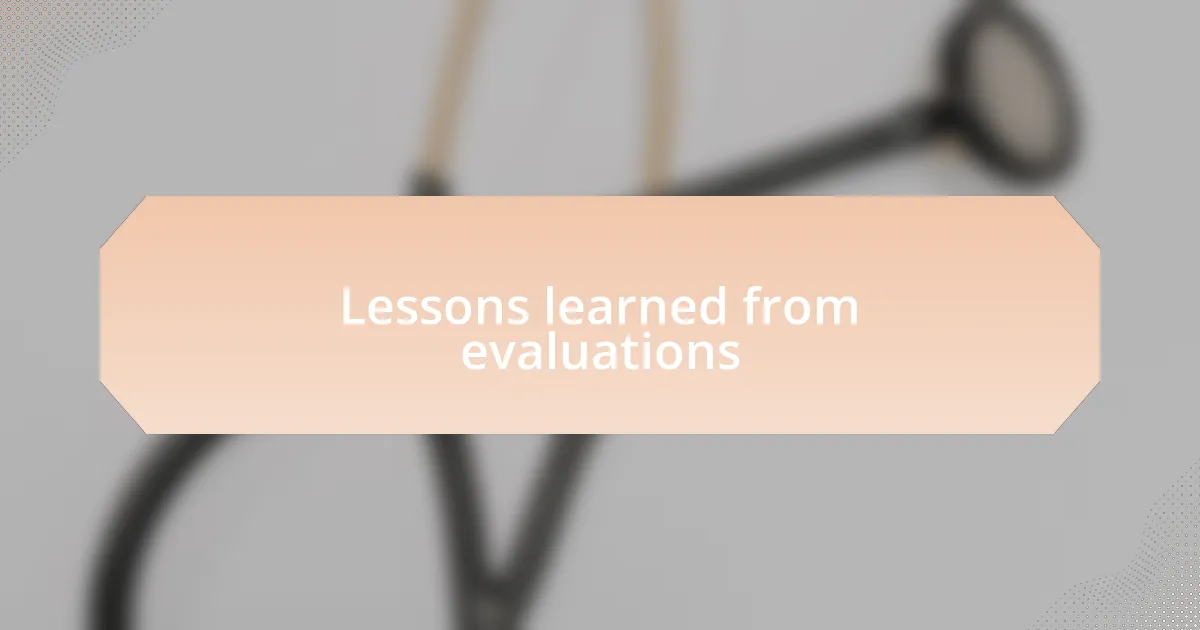
Lessons learned from evaluations
Evaluating trainees taught me that feedback is as much about listening as it is about speaking. I remember a session where, instead of jumping straight into my observations, I opened the floor to the trainee for their own reflections first. This not only eased their anxiety but also provided me with valuable insights that shaped my evaluation. It made me realize that sometimes, the best lessons come from simply allowing others to share their perspectives.
Another crucial lesson was the importance of empathy during evaluations. On one occasion, I had a trainee who struggled with a particular skill but had excelled in other areas. Instead of focusing solely on their weaknesses, I highlighted their strengths and offered guidance on how to improve. This approach transformed the session from a potentially discouraging experience into a motivating one, reinforcing for me that evaluations should inspire growth rather than instill fear.
Lastly, I learned that clarity and consistency are key to effective evaluations. I found myself developing a checklist to ensure I covered important aspects uniformly across different trainees. This structured approach helped me to provide constructive feedback without being overly subjective. It sparked a thought: how can we standardize evaluations while still embracing the individuality of each trainee? Balancing these elements is a continuous learning process, but it ultimately enriches the evaluative experience for everyone involved.

Tips for successful trainee evaluations
When conducting trainee evaluations, one tip I’ve found invaluable is to create a safe environment where trainees feel comfortable sharing their thoughts. I once had a trainee express genuine concerns about their performance; had I not fostered that openness, I might have missed key issues. This experience taught me that a supportive atmosphere can lead to more honest discussions and deeper insights.
Another effective strategy is to personalize feedback. I remember a trainee whose passion for patient care shone during every interaction; I made it a point to celebrate that strength while gently guiding them through areas needing improvement. Isn’t it amazing how a little recognition can fuel motivation? Personalizing evaluations not only acknowledges individual effort but also cultivates a desire for continuous growth.
Additionally, I recommend setting clear objectives before the evaluation begins. During one session, I approached the trainee with specific goals in mind, which helped both of us stay focused. It was transformative; the trainee left with a clear understanding of their path forward. How often do we enter evaluations without a roadmap? Establishing clear expectations can significantly enhance the effectiveness of the evaluation process.